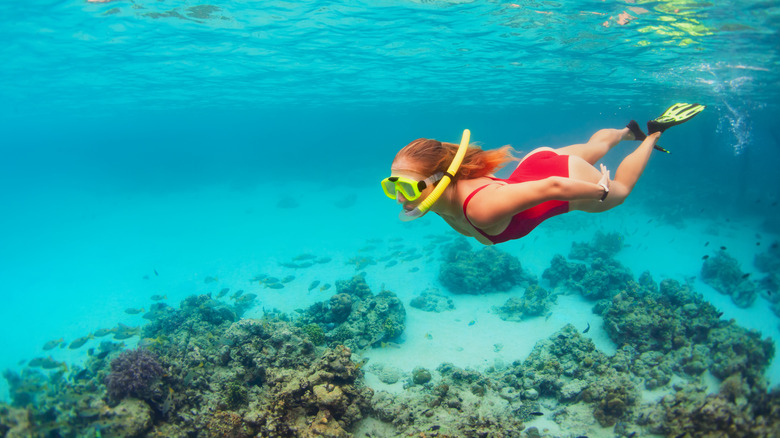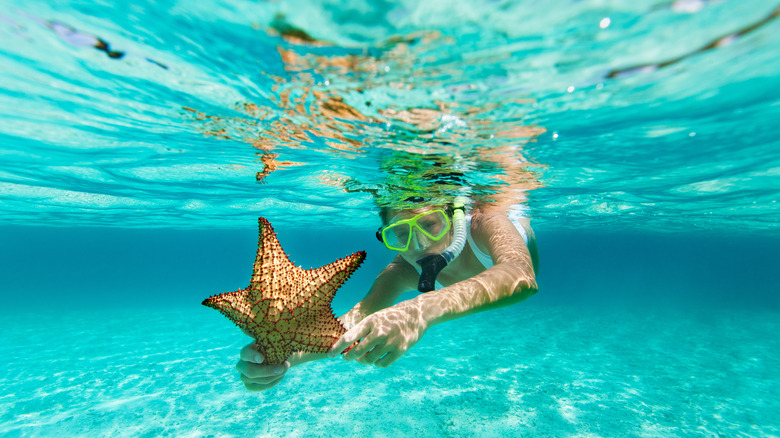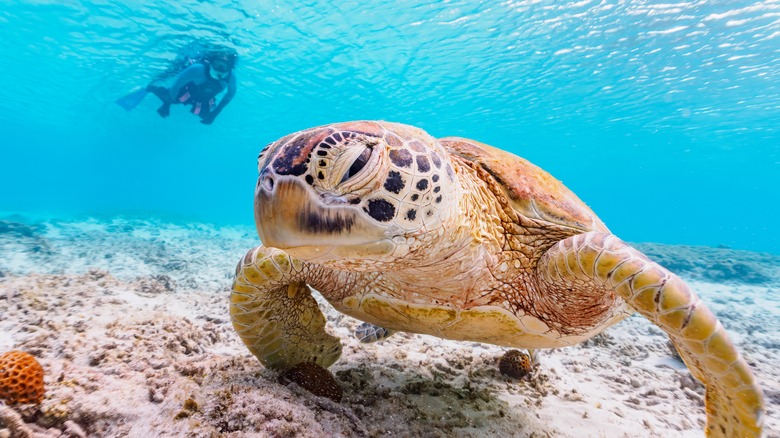The Crucial Reason You Should Never Touch Anything While Snorkeling
With so much beauty beneath the surface of the water, you wouldn't be the first person tempted to reach out and feel the texture of a colorful coral or be overwhelmed by the desire to pet a passing creature or two. After all, how much harm can one quick touch really do? It turns out quite a lot, as marine environments are much more fragile than you might think. Even something as simple as sunscreen can harm marine species, so imagine what your hands and flippers can do. Spoiler alert: it isn't pretty.
Coral reefs are some of the best places for snorkeling, but they also happen to be some of the most delicate parts of the ocean. Though they may look like hard stones or sturdy plants, corals are live animals that require a careful balance of elements to survive. When you touch them, the oils from your hands can disrupt the outer layer that protects them from bacteria, leading to disease and bleaching. With this phenomenon, previously healthy and vibrant corals will turn a stark white color from a change in their environment or stress. And your hands aren't the only danger to corals. Some species only grow a maximum of 2 centimeters per year. So, if you're not careful, a single careless kick could demolish 100 years of growth. Plus, you could accidentally smother the corals with sediment by stirring up the sand with your flippers.
Sea creatures need their space for natural behavior
Whether you're snorkeling the famed hotspots of Hawaii or uncovering the best reefs in the South Pacific, you're bound to run into a number of beautiful creatures in and around the corals. It's important to remember that you're in their home, and these are not domesticated animals. They need space to participate in natural behaviors, like feeding, migrating, breeding, caring for their young, resting, and socializing.
On top of that, many sea creatures have the ability to harm you as a defense mechanism or attack you if they perceive that you're a threat. Sea urchins have spines that can puncture your skin like a needle, fire coral will leave you with a painful burning sensation, hydroid plants can sting you with their cells, and eels are not afraid to bite, to name just a few defenses. Ideally, when viewing animals, your presence should not cause them to change their behavior. Depending on the species, you'll know you're bothering them if they alter their swimming patterns or become territorial.
In the social media age, please don't attempt to wrangle any sea animals for a selfie, like a tourist in Taiwan who was fined $10,000 for posing with a sea turtle or the group in Thailand that faced two years in jail for picking up a starfish and waving it around on camera. Many animals around coral reefs are protected by the Endangered Species Act or the Marine Mammal Protection Act, rendering it illegal for people to bother them.
More tips for safe and respectful snorkeling
At some point, you may get tired and need to rest. In that case, don't stand on the corals. Instead, lie on your back or float in place as if you're sitting in a chair. If you need to adjust your equipment or clear water from your mask, return to the surface and hang onto the boat. Avoid standing on the sandy floor if you can, as creatures like stingrays could be hiding there.
No matter how small, resist the temptation to take anything home from the ocean as a souvenir. Believe it or not, every plant, rock, shell, and sea creature is a valued part of the ecosystem. It may serve a function you don't even realize, like a seashell supplying the area with chemical compounds or a rock providing a home for smaller animals. The general rule of thumb from the National Oceanic and Atmospheric Administration (NOAA) is "Take only pictures and leave only bubbles."
Last but not least, don't be afraid to say something if you see disrespectful behavior from other tourists. Use your voice to protect the animals since they can't do it themselves. Be respectful and cite the facts, like how touching can stress the corals or petting animals can get in the way of natural behaviors. The Professional Association of Diving Instructors (PADI) suggests that people think of themselves as ocean stewards. It's one simple way to ensure our seas will thrive for generations.


